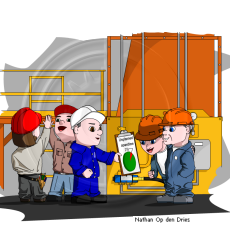Purpose and Goals to Motivate
The panelists were discussing a question from the floor on how to keep team members motivated during a major change initiative or a tough maintenance shut down. It was suggested that the leader needs to keep answering the question of why we're doing what we're doing and what the goal or ultimate purpose is. It was also thrown out that there has to be some positive reinforcement. I couldn't agree more. I believe that positive reinforcement should be offered after some of the small accomplishments have been achieved. Waiting until the end (is there an end?) of a major initiative can be problematic.

A Need for Celebration
I have noticed in my seminars that some maintenance managers and supervisors rarely stop to celebrate with the team they lead. Perhaps this is a natural consequence of the 'nose to grindstone' work ethic that is typical among maintenance leaders. Perhaps many feel that the goal is never achieved. A few supervisors might even be thinking that they are the hardest working member on the team and that if no one from upper management is coming by to celebrate what they've done, then why stop to celebrate with the team they are leading?
Mental Health of an Effective Team
If you've got no employment turn-over on your team and everyone is working collaboratively, and at near one hundred percent effectiveness, then you've got some real magic going for you. Chances are much greater that this not your situation. When you solve problems for a living, it just makes good mental health/motivation sense to stop periodically and celebrate what you've accomplished thus far. This is especially true if you are in the middle of a change initiative and are learning well as a team. The celebration event doesn't have to be expensive or complicated, but it should be done with sincerity and convey meaning. Celebration is a form of positive feedback and reinforcement. It is my step ten in a continuous cycle of steps to remember if you're the kind of leader who believes that the tradespersons and craftspersons on your team are all potential leaders in development. Below you will find the ten steps that were fermenting and churning in my thoughts this summer. Feel free to share your thoughts on these steps.
Ten Step Trades Leadership
1. Hire the best tradespersons
2. Develop the team with continuous training and mentorship
3. Provide the best tools and aids
4. Solve the technical documentation crisis
5. Establish a vision and set high expectations
6. Encourage initiative, collaboration, and true craftsmanship
7. Provide regular feedback and assessments
8. Encourage ownership and team autonomy
9. Insist on accountability and team learning
10. Celebrate team successes!






